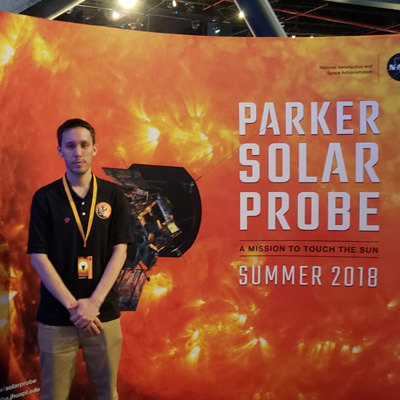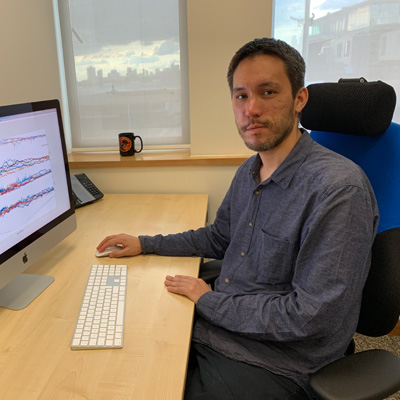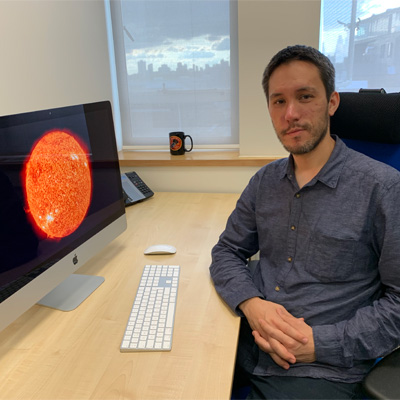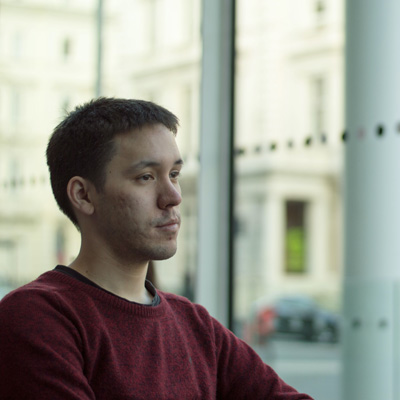Christopher Chen
Queen Mary University of London
Citation
Dr. Christopher H. K. Chen exemplifies the AGU Macelwane Medal’s emphasis on impactful, creative research by an earlycareer scientist. Chris has already established himself asa leader in the area of the kinetic physics of plasma turbulence in the solar wind and magnetosphere. Chris has made innovative breakthroughs in key fundamental questions of solar wind turbulence, thereby throwing light on longstanding problems in magnetohydrodynamic (MHD) turbulence. His work is rooted in space plasma physics and how a fundamental plasma process, such as turbulence, helps shape the physics of the heliosphere. But the implications of his work are wide since MHD turbulence permeates the universe and is responsible for the structural evolution and heating of plasmas in magnetospheres, astrophysical winds, cooling flows and collisionless accretion. Chris is working to understand the 3D nature of MHD turbulence and the detailed, kinetic physics of plasma heating and energy dissipation. He uses instruments on NASA and European Space Agency spacecraft, laboratory measurements and theory, with a focus on the spacecraft measurements. Among his collected publications are several novel analysis techniques that bring into sharp focus the nature, and ultimate fate, of turbulence at scales where simple fluid concepts breakdown. He pioneered calculations of the spectrum of velocity fluctuations as a complement to the more traditional magnetic field and density ones. This enabled him to connect those fluctuations directly to those at larger MHD scales. He has gone on to look at plasma kinetic waves and instabilities, showing how the dissipation of specific waves through interactions with the plasma particle populations leads to telltale features in the turbulent spectrum. He even developed new techniques to reveal the detailed phase space portrait of these interactions. Most recently, Chris has been in the lead with the new measurements from the Parker Solar Probe (PSP) mission. PSP has already made some stunning discoveries, and Chris is one of the most productive and energetic team members.
— Steven J. Schwartz
Laboratory for Atmospheric and Space Physics, Boulder, Colorado
Imperial College London, United Kingdom
Response
First, I’d like to thank Steve Schwartz for nominating me for this medal and Mel Goldstein, Alex Schekochihin and Marco Velli for providing their letters of support. I truly appreciate their support for my career and their positive evaluation of my work.
I would also like to thank AGU and the Macelwane Medal Committee for choosing to present me with this award. AGU plays a significant and central role in advancing Earth and space science, so receiving this medal is a great honor.
This achievement is, of course, not an individual one but is distributed through my network of mentors, collaborators and the wider community. First, I would like to thank the key mentors who have shaped my career: my Ph.D. advisers, Tim Horbury and Alex Schekochihin, who started me in this field and went above and beyond to provide me with the scientific and career advice and support that no doubt led me to be in the position I am in now; my postdoctoral adviser, Stuart Bale, who strongly supported my further development and introduced me to the exciting missions I work on such as Parker Solar Probe; and David Burgess, who has insightfully guided me in the transition to the permanent academic position that I now hold. In addition, a large number of collaborators have also directly contributed — 47 co-authors on my first-authored papers and 451 in total. While far too many to name here, they have really made substantial contributions without which my work would not have been possible, so I would like to thank them all. Also, much of the wider scientific community has also played a role in enabling my work — from the spacecraft instrument and mission teams whose data are essential for my research to the previous and current generations of scientists upon whose work mine builds — the list is really endless. The collaborative and collective nature of science means that an achievement such as this is really the result of countless contributions.
Finally, I would like to thank my parents, who have always supported me in my pursuit of an education and career that would be the best fit for me.
I will do my best to live up to this award and to use it as an opportunity to continue advancing space science and to promote science in general for the benefit of society.
— Christopher Chen
Queen Mary University of London
London, United Kingdom
Field Photos





